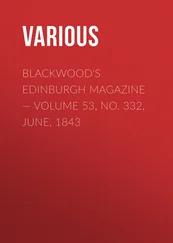Various - Blackwoods Edinburgh Magazine – Volume 55, No. 341, March, 1844
Здесь есть возможность читать онлайн «Various - Blackwoods Edinburgh Magazine – Volume 55, No. 341, March, 1844» — ознакомительный отрывок электронной книги совершенно бесплатно, а после прочтения отрывка купить полную версию. В некоторых случаях можно слушать аудио, скачать через торрент в формате fb2 и присутствует краткое содержание. Жанр: foreign_antique, periodic, foreign_edu, на английском языке. Описание произведения, (предисловие) а так же отзывы посетителей доступны на портале библиотеки ЛибКат.
- Название:Blackwoods Edinburgh Magazine – Volume 55, No. 341, March, 1844
- Автор:
- Жанр:
- Год:неизвестен
- ISBN:нет данных
- Рейтинг книги:5 / 5. Голосов: 1
-
Избранное:Добавить в избранное
- Отзывы:
-
Ваша оценка:
- 100
- 1
- 2
- 3
- 4
- 5
Blackwoods Edinburgh Magazine – Volume 55, No. 341, March, 1844: краткое содержание, описание и аннотация
Предлагаем к чтению аннотацию, описание, краткое содержание или предисловие (зависит от того, что написал сам автор книги «Blackwoods Edinburgh Magazine – Volume 55, No. 341, March, 1844»). Если вы не нашли необходимую информацию о книге — напишите в комментариях, мы постараемся отыскать её.
Blackwoods Edinburgh Magazine – Volume 55, No. 341, March, 1844 — читать онлайн ознакомительный отрывок
Ниже представлен текст книги, разбитый по страницам. Система сохранения места последней прочитанной страницы, позволяет с удобством читать онлайн бесплатно книгу «Blackwoods Edinburgh Magazine – Volume 55, No. 341, March, 1844», без необходимости каждый раз заново искать на чём Вы остановились. Поставьте закладку, и сможете в любой момент перейти на страницу, на которой закончили чтение.
Интервал:
Закладка:
To disdain this exquisite art, is a proof of barbarism. The nations of the East may cause their dances to be performed by slaves; but two of the greatest kings of ancient and modern times, the kings after God's own heart and man's own heart—David and Louis le Grand—were excellent dancers, the one before the ark, the other before his subjects.
Never, perhaps, did the art of dancing attain such eminent honours in the eyes of mankind, as during the siècle doré of the latter monarch. At an epoch boasting of Molière and Racine, Bossuet and Fénélon, Boileau and La Fontaine, Colbert and Perrault, (the fairy talisman of politics and architecture,) the court of Versailles could imagine no manifestation of regality more august, or more exquisite, than that of getting up a royal ballet; and the father of his people, Louis XIV., was, in his youth, its coulon .
How amusing are the descriptions of these entrées de ballet , circumstantially bequeathed us by the memoirs of the regency of Anne of Austria! The cardinal himself took part in them; but the chief performers were the young King, his brother Gaston d'Orleans, and the maids of honour, figuring as Apollo and the Muses, or Hamadryads adoring some sylvan divinity. Who has not sympathized in the joy of Madame de Sevigné, at seeing her fair daughter exhibit among the coryphées ! Who has not felt interested in the jetées and pas de bourrées of the ancien régime , when accomplished at court by Condés, Contis, Montpensiers, Montmorencys, Rohans, Guises! The Marquis de Dangeau first recommended himself to the favour of the royal master whose courts he was destined to journalize for posterity, by the skill of his pas de basques ; and long before the all but conjugal influence of the lovely La Vallière commenced over the heart of the grand monarque , his early love, and more especially his passion for the beautiful niece of the Cardinal, may be traced to the rehearsals and rondes de jambes of Maitz and Fontainbleau.
The reign of Madame de Maintenon ( la raison même ) over his affections, declared itself by the sudden transfer of a ballet-opera, expressly composed by Rameau and Quinault for the beauties of the court, to the public theatre of the Palais Royal. No more noble figurantes at Versailles! Louis le Pirouettiste's occupation was gone; and the maître des ballets du roi arrayed himself in sackcloth and ashes. But, lo! the glories of his throne took wing with the loves and graces; ballets and victories being effaced on the same page from the annals of his reign.
During the minority of Louis XV., the same royal dansomania was renewed. The regent, Duke of Orleans, entertained the same notions of kingly education, on this head, as his predecessor the cardinal; and Louis le Bien-aimé , like his great-grandfather before him, was the best dancer of his realm. Such dancing as it was! such exquisite footing! In the upper story of the grand gallery at Versailles, hang several pictures representing these court ballets; Cupids in coatees of pink lustring, with silver lace and tinsel wings, wearing full-bottomed wigs and the riband of the St Esprit; or Venuses in hoops and powder, whose minauderies might afford a lesson to the divinities of our own day for the benefit of the omnibus box.
Some of these groups, by Mignard, Boucher, and their imitators, are charming studies as tableaux de genre . But in nothing, by the way, are they more remarkable than in their decency . The nudities of the present times appear to have been undreamed of in the philosophy of Versailles. That simple-hearted, though strong-minded American writer, Miss Sedgwick, who has published an account of her consternation as she sat with Mrs Jameson in the stalls of our Italian opera, might have witnessed the royal performance unabashed. On being told, as she gazed upon the intrepid self-exposure of Taglioni, " qu'il fallait être sage pour danser comme ça ," Miss S. observes, that it requires to be more or less than woman, and proposes to divide the human species into men, women, and OPERA-DANCERS, little suspecting that half her readers translate such a classification into "men, women, and ANGELS;" or that they would see herself and her sister moralist go down in the President without a pang, provided Elssler and Taglioni were saved from the deep!
Natural enough! we repeat it—natural enough! To create a good dancer, requires the rarest combination of physical and mental endowments. Graceful as the forms transmitted to us by the pottery of Etruria and the frescoes of Herculaneum, she must unite with the strength of an athlete, the genius of a first-rate actress. That even moderate dancing demands immoderate abilities, is attested by the exhibition of human ungainliness disfiguring all the court balls of Europe. There may be seen the representatives of the highest nobility, tutored by the highest education, shuffling over the polished floor with stiffened arms and bewildered legs—often out of time—always out of place—as if acting under the influence of a galvanic battery. Not one in ten of them rises even to mediocrity as a dancer. A few degrees lower in the social scale, and it would be not one in twenty. Amid the shoving, shouldering, shuffling mob of dancers in an ordinary ball-room, the absence of all grace amounts even to the ludicrous. Forty years long have people been dancing the quadrilles now in vogue, which consist of six favourite country-dances, fashionable in Paris at the close of the last century, and then singly known by the names they still retain—"La Poule, L'Eté, Le Pantalon, Le Trenis," &c. &c. To avoid the monotony of dancing each in succession, for hours at a time, down a file of forty couple, it was arranged that every eight couple should form a square, and perform the favourite dances, in succession, with the same partner—a considerable relief to the monotony of the ball-room. Yet, after all this experience, if poor Monsieur le Trenis (after whom one of the figures was named, and who, during the consulate, died dancing-mad in a public lunatic asylum) could rise, sane, from the dead, it would be enough to drive him mad again to see how little had been acquired, in the way of practice, since his decease. The processes and varieties of the ball-room are just where he left then on his exit!
Previous to the introduction of quadrilles and country dances or contredanses , the inaptitude of nine-tenths of mankind for dancing was still more eminently demonstrated in the murders of the minuet. For (as Morall, the dancing-master of Marie Antoinette, used passionately to exclaim)— que de choses dans un minuet ! What worlds of modest dignity—of alternate amenity and scorn! The minuet has all the tender coquetry of the bolero, divested of its licentious fervour. With the minuet and the hoop, indeed, disappeared that powerful circumvallation of female virtue, rendering superfluous the annual publication of a dozen codes of ethics, addressed to the "wives of England" and their daughters. All was comprehended in the pas grave . That noble and right Aulic dance was expressly invented in deference to the precariousness of powdered heads; and its calm sobrieties, once banished from the ball-room, revolutionary boulangères succeeded—and chaos was come again! The stately pavon had possession of the English court, with ruffs and farthingales, in the reign of Elizabeth. With the Stuarts came the wild courante or corante—
"Hair loosely flowing, robes as free"—
and if the House of Hanover, and minuets, reformed for a time the irregularities of St James's—what are we to expect now that waltzes, galops, and the eccentricities of the cotillon have possession of the social stage? WHAT NEXT? as the pamphlets say—"What will the lords do?"—what the ladies?
Читать дальшеИнтервал:
Закладка:
Похожие книги на «Blackwoods Edinburgh Magazine – Volume 55, No. 341, March, 1844»
Представляем Вашему вниманию похожие книги на «Blackwoods Edinburgh Magazine – Volume 55, No. 341, March, 1844» списком для выбора. Мы отобрали схожую по названию и смыслу литературу в надежде предоставить читателям больше вариантов отыскать новые, интересные, ещё непрочитанные произведения.
Обсуждение, отзывы о книге «Blackwoods Edinburgh Magazine – Volume 55, No. 341, March, 1844» и просто собственные мнения читателей. Оставьте ваши комментарии, напишите, что Вы думаете о произведении, его смысле или главных героях. Укажите что конкретно понравилось, а что нет, и почему Вы так считаете.












